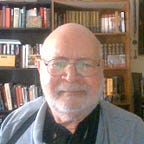Are We Perfectible?
Are we progressing? Not just evolving into more complex beings, but are we getting smarter? More moral? Are we learning to be more responsible to our selves? To our families? To our neighbors? To our habitat? That is what the article attempts to address. Certainly not totally in one article, butat least a new beginning.
I think it beyond doubt that modernism was and is a foolishly optimistic assertion of the perfectibility of the human race. Its rejection of God, or at least, of knowledge about God I believe was based on the obvious failure of religion to improve the human condition.
In rejecting God but still clinging to the false belief in the perfectibility of humanity, they in essence, began with a faulty understanding of God, religion and the universe.
In believing that the core of religion was to perfect humanity, they blamed the idea of God, an obviously non-functioning entity because religion has proved itself unable to perfect humanity.
That viewpoint is an admission that humanity is imperfect. Yet, the modernist viewpoint decided, incongruously, to assert that humanity is basically good, when it very obviously is not.
Further shackling their viewpoint to falsehood by claiming that the universe evolved from a chaotic beginning and continues to evolve. With no God, the universe is a closed system. Yet, Newton’s laws of thermodynamics have not been disproved: In a closed system, the system tends toward entropy. Wikipedia, in its summary of the laws of thermodynamic states “…the second law of thermodynamics states that its total entropy is continually increasing. It has been speculated, since the 19th century, that the universe is fated to a heat death in which all the energy ends up as a homogeneous distribution of thermal energy so that no more work can be extracted from any source.”
Wikipedia goes on to say that some physicists have argued against the idea of the ultimate death of the universe. They are apparently by far in the minority and only speculate that some force will limit entropy before absolute entropy is reached. No one argues against the notation that entropy is expanding as the universe expands. Bottom line, the timeline is at odds with the theory of evolution.
Furthermore, there is no corroborating evidence supporting progressivism. And, without God, life itself is inexplicable. If the universe began with the Big Bang and has been moving toward entropy for the 4, 8, or 12 (the necessary age keeps expanding) how did a dying universe generate life spontaneously? It is science’s increasing need for more time to fit its obvious shortcomings. It renders the young-earth viewpoint of the Bible more believable to me.
What does all of this apply to a discussion about philosophy? It argues strongly against the basic goodness of humanity and it argues against the perfectibility of us and of our accumulation of knowledge. Have we accumulated information? Of course we have. Does that equate to knowledge? Some of the information can contribute to knowledge, but not necessarily so.
Quality of output depends on quality of input. And, it is our tendency to be unwilling or unable to accept our errors. Our theories have all manner of errors of fact as well as of conclusions woven throughout them. Structural flaws will inevitably bring about the collapse of the whole. The question is whether we continue to build on such a flimsy foundation, or begin over.
